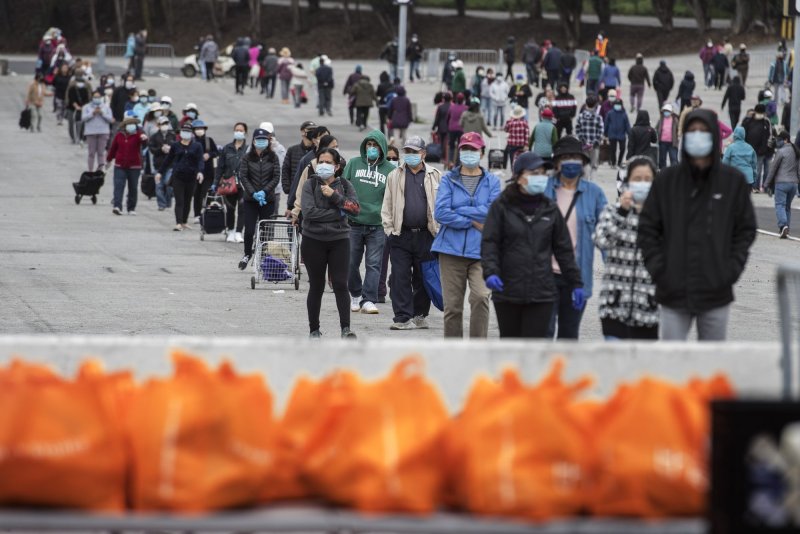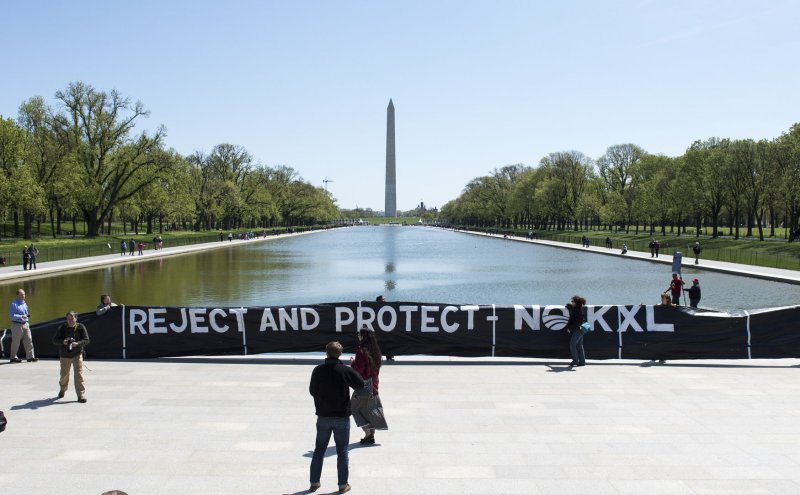
A stigma has prompted some nonreligious people to conceal their identity, a survey says. Photo by B_Me/Pixabay
May 11 (UPI) -- A new report says atheists in the United States face such widespread stigma and discrimination that many of them conceal their nonreligious identity from relatives, co-workers and people at school.
Atheist residents of "very religious" communities are especially likely to experience discrimination in education, employment and public services such as jury duty, according to Reality Check: Being Nonreligious in America, a survey released this month by American Atheists, a Cranford, N.J.-based nonprofit that advocates civil rights for nonreligious people.
The report says that although the percentage of Americans who consider themselves religious has been declining for decades and the diversity of religious beliefs has increased, nonreligious people "continue to live in a culture dominated by Christianity."
"Like religious minorities, nonreligious people too often face discrimination in various areas of life, as well as stigmatization, because of their beliefs," the report says.
Survey results
The report was based on the U.S. Secular Survey, which was created and managed by Strength in Numbers Consulting Group in New York. Nearly 34,000 participants age 18 or older who self-identified as atheists, agnostics, humanists, freethinkers, skeptics or secular people responded to the survey between Oct. 15 and Nov. 2.
"The Reality Check report reveals how widespread discrimination and stigma against nonreligious Americans is," American Atheists said in a news release. "Due to their nonreligious identity, more than half of survey participants had negative experiences with family members, nearly one-third in education and more than 1 in 5 in the workplace."
The percentage of survey respondents who mostly or always conceal their nonreligious identity from members of their immediate family was 31.4. The percent for co-workers was 44.3 and 42.8 for people at school, according to the report.
Among respondents under age 25, 21.9 percent reported their parents are not aware of their nonreligious beliefs. In that age group, 29.2 percent of those with parents who know about their nonreligious identity said they were somewhat or very unsupportive of their beliefs.
"We found that family rejection had a significant negative impact on participants' educational and psychological outcomes," the report says. "For example, participants with unsupportive parents had a 71.2 percent higher rate of likely depression than those with very supportive parents."
Among respondents under age 25, 21.9 percent reported their parents are not aware of their nonreligious beliefs. In that age group, 29.2 percent of those with parents who know about their nonreligious identity said they were somewhat or very unsupportive of their beliefs.
"We found that family rejection had a significant negative impact on participants' educational and psychological outcomes," the report says. "For example, participants with unsupportive parents had a 71.2 percent higher rate of likely depression than those with very supportive parents."
ALMOST HALF IS LESS THAN 50%
Geographic differences
The experiences of nonreligious people vary dramatically in different parts of the nation, Reality Check says. Nonreligious beliefs might be causally accepted in some states, including California and Vermont, but the stigmatization and concealment were higher on average in states survey participants reported as "very religious."
To reach those conclusions, survey participants were asked to assess how religious the people are in the community where they live and to rank the frequency -- never, seldom, sometimes, frequently or almost always -- that they had encountered nine types of "microaggressions" in the past year. Those experiences included being asked to go along with religious traditions to avoid stirring up trouble; being bothered by religious symbols or text in public places; being told they are not a "good person" because they are secular or nonreligious; and being asked by people to join them in thanking God for a fortunate event.
"As might be expected, participants from rural locations (49.6 percent) and small towns (42.7 percent) were more likely to say their current setting was 'very religious' than those from other settings (23.7 percent)," the report says. "Stigmatization and concealment were higher on average in states that participants reported are 'very religious.'"
The survey ranks Utah as the most religious state based on 80 percent of survey participants who live there calling their community "very religious." Mississippi is second with 78.7 percent.
Mississippi ranks as the worst state for stigma against nonreligious people and as the state where they are most often forced to conceal their beliefs. Utah is ranked as the second worst.
Sarah Worrel said she had friends of many faiths while growing up in Long Island, N.Y., and "you didn't presume someone was religious or of a particular religion until they told you." It's different in Mississippi, where she's lived since age 12.
"There's so little cultural diversity that it's assumed that you are some form of Christian unless you state otherwise," Worrel, the American Atheists assistant state director for Gulfport, wrote in an email. "I've met many atheists, pagans and other non-Christians here, but I usually don't find that out until I've gotten to know them well."
Worrel said she's had encounters with strangers trying to push religion on her and is always honest about her lack of belief but has not faced any serious discrimination. However, a friend lost a job for being an atheist, she said.
Questioning religion
Dan Ellis, the Utah state director for American Atheists, also is open about being an atheist.
Ellis said that as a child, he couldn't square what he learned in The Church of Jesus Christ of Latter-day Saints with stories of a Biblical flood that destroys everything. His teacher couldn't explain why a loving God would kill babies in such a cruel way, he said.
Ellis, who was never a firm believer, also was unable to get satisfactory answers to his questions from church leaders and as an adult, he eventually became a "Jack Mormon," a term for an inactive member of the LDS Church.
For a long time, he thought it was wrong to be a non-believer. He wasn't sure how to refer to himself until he was in his mid-20s and a co-worker revealed that he was an atheist. Ellis began using that label for himself with close friends and family.
At the time, people he knew linked atheism with satanism, he said. Ellis lost friends and angered some relatives, who cut him out of their lives.
"There's a lot of discrimination and recrimination in Utah against atheists," Ellis said, adding that many atheists can't be open about being nonreligious for fear of losing their job.
Overlooked viewpoint
Other survey findings include:
Geographic differences
The experiences of nonreligious people vary dramatically in different parts of the nation, Reality Check says. Nonreligious beliefs might be causally accepted in some states, including California and Vermont, but the stigmatization and concealment were higher on average in states survey participants reported as "very religious."
To reach those conclusions, survey participants were asked to assess how religious the people are in the community where they live and to rank the frequency -- never, seldom, sometimes, frequently or almost always -- that they had encountered nine types of "microaggressions" in the past year. Those experiences included being asked to go along with religious traditions to avoid stirring up trouble; being bothered by religious symbols or text in public places; being told they are not a "good person" because they are secular or nonreligious; and being asked by people to join them in thanking God for a fortunate event.
"As might be expected, participants from rural locations (49.6 percent) and small towns (42.7 percent) were more likely to say their current setting was 'very religious' than those from other settings (23.7 percent)," the report says. "Stigmatization and concealment were higher on average in states that participants reported are 'very religious.'"
The survey ranks Utah as the most religious state based on 80 percent of survey participants who live there calling their community "very religious." Mississippi is second with 78.7 percent.
Mississippi ranks as the worst state for stigma against nonreligious people and as the state where they are most often forced to conceal their beliefs. Utah is ranked as the second worst.
Sarah Worrel said she had friends of many faiths while growing up in Long Island, N.Y., and "you didn't presume someone was religious or of a particular religion until they told you." It's different in Mississippi, where she's lived since age 12.
"There's so little cultural diversity that it's assumed that you are some form of Christian unless you state otherwise," Worrel, the American Atheists assistant state director for Gulfport, wrote in an email. "I've met many atheists, pagans and other non-Christians here, but I usually don't find that out until I've gotten to know them well."
Worrel said she's had encounters with strangers trying to push religion on her and is always honest about her lack of belief but has not faced any serious discrimination. However, a friend lost a job for being an atheist, she said.
Questioning religion
Dan Ellis, the Utah state director for American Atheists, also is open about being an atheist.
Ellis said that as a child, he couldn't square what he learned in The Church of Jesus Christ of Latter-day Saints with stories of a Biblical flood that destroys everything. His teacher couldn't explain why a loving God would kill babies in such a cruel way, he said.
Ellis, who was never a firm believer, also was unable to get satisfactory answers to his questions from church leaders and as an adult, he eventually became a "Jack Mormon," a term for an inactive member of the LDS Church.
For a long time, he thought it was wrong to be a non-believer. He wasn't sure how to refer to himself until he was in his mid-20s and a co-worker revealed that he was an atheist. Ellis began using that label for himself with close friends and family.
At the time, people he knew linked atheism with satanism, he said. Ellis lost friends and angered some relatives, who cut him out of their lives.
"There's a lot of discrimination and recrimination in Utah against atheists," Ellis said, adding that many atheists can't be open about being nonreligious for fear of losing their job.
Overlooked viewpoint
Other survey findings include:
African-Americans who are nonreligious and ex-Muslims encounter significantly higher rates of discrimination and stigma.
Most participants were raised in the Christian religion, either in Protestant Christian (54.7 percent) or Catholic (29.9 percent) households. One in seven participants (14.3 percent) were raised in nonreligious households.
About 12 percent of survey participants reported being threatened in the past three years because of their secular identity.
Nick Fish, president of American Atheists, said in a news release that the struggles of nonreligious people are often overlooked.
"Thankfully, the U.S. Secular Survey has revealed the discrimination our community regularly faces," Fish said. "With that well-established, we need to find solutions and work toward ending the stigma faced by our community."
CHRISTIANITY THE GREATEST CREATOR OF ATHEISTS EVER









